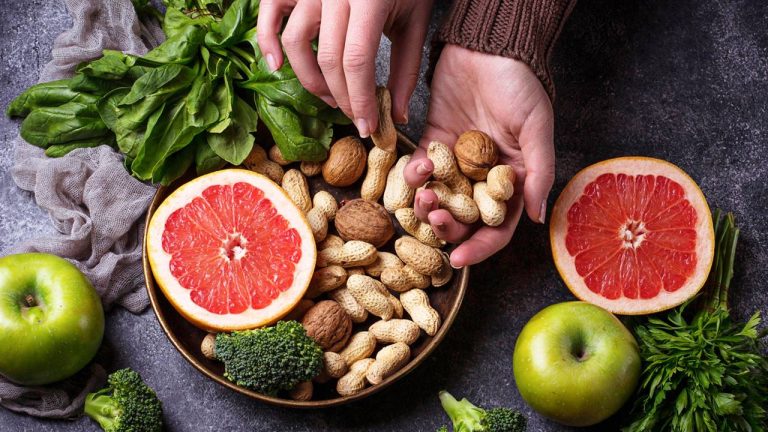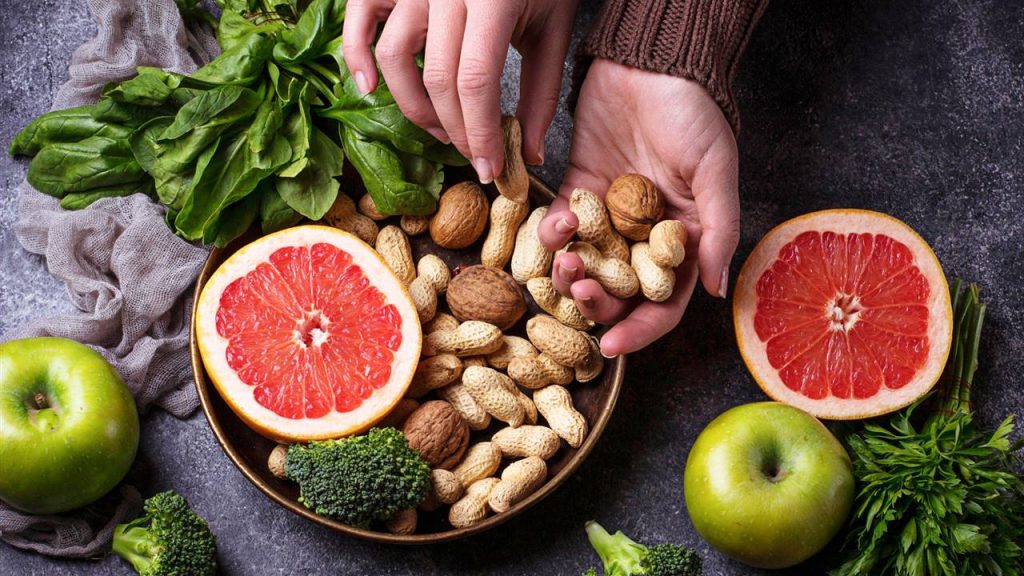
We give you the keys to choosing heart-friendly foods and a weekly heart-healthy menu ideal for taking care of the heart and preventing cardiovascular diseases.

- The Best Diet for the Heart
- 1. Control sugar levels
- 2. Avoid high homocysteine
- 3. Regulate cholesterol and prevent oxidation
- 4. Moderate salt consumption to avoid high blood pressure
- 5. Choosing heart-healthy fats
- 6. The Best Heart Foods
- Weekly heart-healthy menu
- Habits that protect the heart
Cardiovascular diseases are the leading cause of death in Spain and the world, but many premature deaths could be avoided by controlling risk factors and taking care of lifestyle habits. Tobacco, inadequate diet or sedentary lifestyle are factors that favor cardiovascular disease. On the other hand, maintaining a healthy weight, an active life, a heart-healthy diet with plenty of vegetables, learning to manage stress and ensuring a restful rest, are tools and habits that contribute to taking care of the heart.
THE BEST DIET FOR THE HEART
When it comes to improving the diet to take care of heart health, we can follow two complementary strategies. On the one hand, it is important to introduce good foods for the heart into the diet.
On the other hand, it is essential to take two basic measures:
- Maintain adequate glucose levels
- Avoid an excessive increase in homocysteine levels in the blood
We can also look at cholesterol and other aspects that directly or indirectly influence cardiovascular health.
1. CONTROL SUGAR LEVELS
Maintaining adequate blood glucose levels and preventing blood sugar spikes to prevent insulin resistance and diabetes reduces the risk of cardiovascular disease and chronic inflammation.
This is achieved by eliminating added sugars and excess carbohydrates of rapid absorption (sweets, pastries and products made with refined flours) and increasing the proportion of tubers (chilled potato and sweet potato), roots (beetroot, carrot, etc.) and foods that provide abundant fiber.
2. AVOID HIGH HOMOCYSTEINE
It is a mistake to look at total cholesterol figures in blood tests as the main preventive measure; Homocysteine values are more determinant when establishing the risk of cardiovascular disease. It is therefore important to monitor homocysteine blood levels
Homocysteine elevates cellular oxidative stress and participates in the development of cardiovascular disease. It also affects neurons and facilitates the formation of atheromatous plaques in the arteries.
Adequate homocysteine levels are below 15 mcmol/L.
To reduce homocysteine, it is necessary to consume sufficient amounts of folic acid and other B vitamins (especially vitamin B6) and magnesium.
- Folic acid or vitamin B9 is found in green leafy vegetables and other vegetables, especially raw ones, legumes, and fruits.
- Vitamin B6, in wheat germ, whole grains, bananas and cabbages.
- Magnesium, which is involved in the contraction-relaxation mechanism of muscle tissue, is found in spinach, cabbage, soy, oats, wheat germ, almonds, dates, sesame, cocoa and brewer’s yeast.
It is also important to manage stress, because chronic stress consumes these nutrients that we have mentioned and the body’s needs increase.
3. REGULATE CHOLESTEROL AND PREVENT OXIDATION
We have already seen that controlling cholesterol is not the main preventive measure. In fact, when assessing cholesterol, what you have to look at first of all is the levels of lipoproteins A and B, and VLDL (very low-density lipoproteins, whose value is estimated from triglycerides).
In addition, we must bear in mind that cholesterol is an essential molecule in the functioning of the body, which is only a problem when it is oxidized and this happens due to excess glucose in the blood.
4. MODERATE SALT CONSUMPTION TO AVOID HIGH BLOOD PRESSURE
High glucose level, insulin resistance and inflammation are also at the origin of high blood pressure, the other major cardiovascular risk factor.
The good news is that a healthy lifestyle can improve blood pressure. Especially with physical exercise, a heart-healthy diet, good sleep and stress control. If necessary, medication helps regulate tension, but this may not be the only preventive measure.
The diet to control blood pressure, specifically, has to be low in sodium and sugars. It is appropriate, for example, to reduce the consumption of bread because of its contribution of salt and carbohydrates.
5. CHOOSING HEART-HEALTHY FATS
Currently not all saturated fats are considered harmful to cardiovascular health. A large study (more than 340,000 subjects and a follow-up of up to 23 years) published in the American Journal of Clinical Nutrition in 2010 concluded that “saturated fat intake is not associated with increased risk of coronary heart disease, stroke, or cardiovascular disease.”
But to take care of the heart it is advisable to choose the fatty acids with the most beneficial properties from the point of view of cardiovascular health:
- Omega-3 fatty acids, which, in addition to fatty fish, are found in walnuts and flax and chia seeds.
- Omega-9 or monounsaturated fatty acids, found in olive oil, avocado and nuts such as cashews or hazelnuts.
These foods are anti-inflammatory and regulate triglyceride and homocysteine levels, as well as reducing the risk of thrombosis.
Instead, partially hydrogenated (trans) fats and excess omega-6 (in sunflower, corn and many margarine oils) should be avoided because of their inflammatory effect.
6. THE BEST HEART FOODS
Some foods can almost be considered medicinal when it comes to improving the diet to take care of the heart. Here are four outstanding heart-healthy foods:
- Garlic and onions are interesting, as they contain elements that help thin the blood, prevent oxidation of cholesterol and prevent arteriosclerosis. They can be consumed daily, especially raw.
- Black grapes contain resveratrol, an antioxidant compound that dilates the arteries, so it improves circulation. It is found mostly in skin and seeds.
- Ceylon cinnamon regulates sugar levels and naturally sweetens preparations. If used recurrently, it prevents blood glucose spikes that favor insulin resistance and inflammation.
- Unsweetened green tea is highly recommended for its antioxidant richness. Studies link its regular consumption with a lower cardiovascular risk, in part because it helps prevent cholesterol oxidation.
On the other hand, supplementation with coenzyme Q10, a molecule found in high concentrations in the heart and is necessary for the mitochondria of the cells to produce energy, may be recommended. The body is able to produce this substance, but over the years it does so less and less effectively.
The heart and the pericardium that surrounds it are above the brain as centers of health and well-being, as they house the sheen or spirit according to traditional Chinese medicine. According to this medical tradition, joy but also bitter tastes, as in the case of green tea, tone it.
HABITS THAT PROTECT THE HEART
Along with food, it is important to incorporate heart-healthy habits that will help keep our heart in shape.
- Rest. Sleeping 6 hours or less, or more than 9 hours, is linked to an increased risk of heart disease, especially in men.
- Relaxation. Meditation, positive emotions, having hobbies, contact with nature and friendly relationships reduce stress and the risk of heart attack. It is vitally important to learn to set limits and say no, and take care of our emotional part.
- Exercise. It improves blood flow, decreases insulin resistance and reduces stress hormone levels. 30 minutes a day of exercise may be enough.
- Intermittent fasting. The control of the number of daily calories and intermittent fasting, which sets in motion tissue regeneration mechanisms, are great allies for the health of our heart.
- Take care of the health of the mouth. Periodontal disease harms cardiovascular health. To avoid it, it is advisable to follow the advice of the dentist.